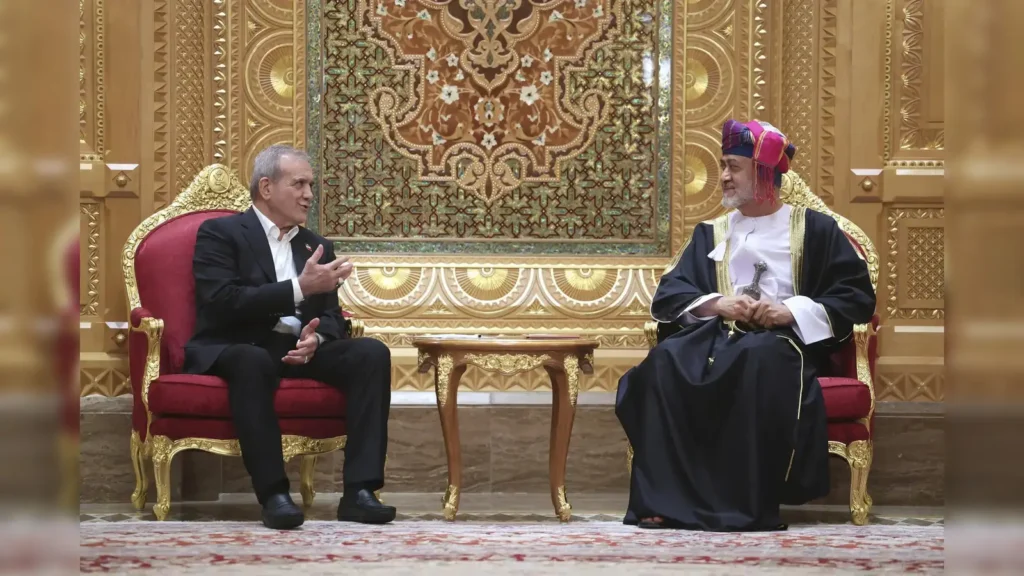TEHRAN — Iran is preparing to formally reject a new U.S. nuclear proposal aimed at resolving the long-standing dispute over its atomic program, with a senior Iranian diplomat dismissing the offer as a “non-starter” that fails to reflect Tehran’s core interests or provide concessions on uranium enrichment and economic sanctions.

The proposed framework, conveyed to Iranian officials on Saturday by Omani Foreign Minister Sayyid Badr Albusaidi, who has been mediating indirect talks between Tehran and Washington, was met with skepticism from Iranian negotiators. “Iran is drafting a negative response to the U.S. proposal, which could be interpreted as a rejection of the U.S. offer,” said a diplomat familiar with the matter, speaking anonymously due to its sensitivity.
According to the diplomat, the American proposal leaves unchanged Washington’s insistence that Iran abandon its uranium enrichment program and fails to provide a clear mechanism for lifting sanctions that have crippled the country’s oil-dependent economy.
The stalled nuclear talks follow five rounds of indirect discussions between Iranian Foreign Minister Abbas Araqchi and President Donald Trump’s Middle East envoy Steve Witkoff. The negotiations have hit repeated roadblocks, particularly over Iran’s refusal to cease enrichment activities or export its stockpile of highly enriched uranium — material that could potentially be used to develop nuclear weapons.
Tehran maintains that its nuclear ambitions are strictly peaceful and aimed at civilian energy production, rejecting accusations from the West that it seeks to build nuclear arms.
“In this proposal, the U.S. stance on enrichment on Iranian soil remains unchanged, and there is no clear explanation regarding the lifting of sanctions,” the Iranian diplomat said, adding that Araqchi is expected to issue Tehran’s official response soon.
Iran insists that all U.S. sanctions, especially those targeting vital economic institutions like the central bank and national oil company, be lifted unconditionally. Washington, however, favors a phased approach, where nuclear-related sanctions would be eased only as Tehran demonstrates compliance.
Since 2018, the U.S. has blacklisted dozens of Iranian entities, accusing them of supporting terrorism and nuclear proliferation. President Trump’s “maximum pressure” campaign — revived after his return to the White House in January — has included sweeping sanctions and threats of military action should talks fail.
Trump had previously pulled the U.S. out of the 2015 nuclear agreement during his first term, reimposing sanctions that severely harmed Iran’s economy. In response, Iran ramped up its uranium enrichment far beyond the limits set by the pact, effectively dismantling much of the deal’s original framework.
Under the 2015 agreement, Iran agreed to curtail its nuclear activities in exchange for the lifting of U.S., European Union, and United Nations sanctions. That deal collapsed after the U.S. withdrawal.
The Iranian diplomat said the latest proposal is being reviewed by the country’s nuclear negotiations committee, operating under the supervision of Supreme Leader Ayatollah Ali Khamenei. The committee’s assessment concluded that the U.S. proposal is “completely one-sided” and prioritizes American and Israeli interests over Iran’s national security.
“This is not a genuine negotiation,” the diplomat said. “It is an attempt to impose a bad deal through excessive demands.”
The nuclear standoff has added new volatility to the already fragile security situation in the Middle East. Trump’s administration is seeking to prevent Iran from acquiring the capability to produce a nuclear weapon — a move that could ignite a regional arms race and pose a threat to Israel. Iran’s leadership, meanwhile, is determined to end the economic strangulation brought on by years of international sanctions.
While Tehran has indicated openness to certain limits on its enrichment program, it is demanding guarantees that Washington will not walk away from any future agreement, as it did in 2018.
Two senior Iranian officials told Reuters last week that Iran might consider pausing enrichment if the U.S. releases billions in frozen Iranian assets and formally recognizes Tehran’s right to enrich uranium for peaceful purposes — a potential foundation for a broader agreement.
Israel, which views Iran’s nuclear program as an existential threat, has pledged to prevent Tehran from ever developing nuclear weapons. Speaking in Cairo on Monday, Araqchi downplayed the likelihood of a direct Israeli military strike on Iran, saying, “I do not think Israel will commit such a mistake as to attack Iran.”
Iran’s regional influence has also diminished in recent months, due in part to battlefield setbacks for its allies within the Shiite-led “Axis of Resistance” — including Hezbollah in Lebanon, Hamas in Gaza, the Houthi rebels in Yemen, and several Iranian-backed militias in Iraq.
In April, Saudi Arabia’s defense minister urged Iranian leaders to consider Trump’s offer seriously, warning that continued defiance risked provoking a war with Israel.
As diplomatic efforts stall, the risk of a broader confrontation continues to loom, with Iran’s rejection of the U.S. proposal likely to intensify regional instability and deepen the divide between Tehran and the West.



